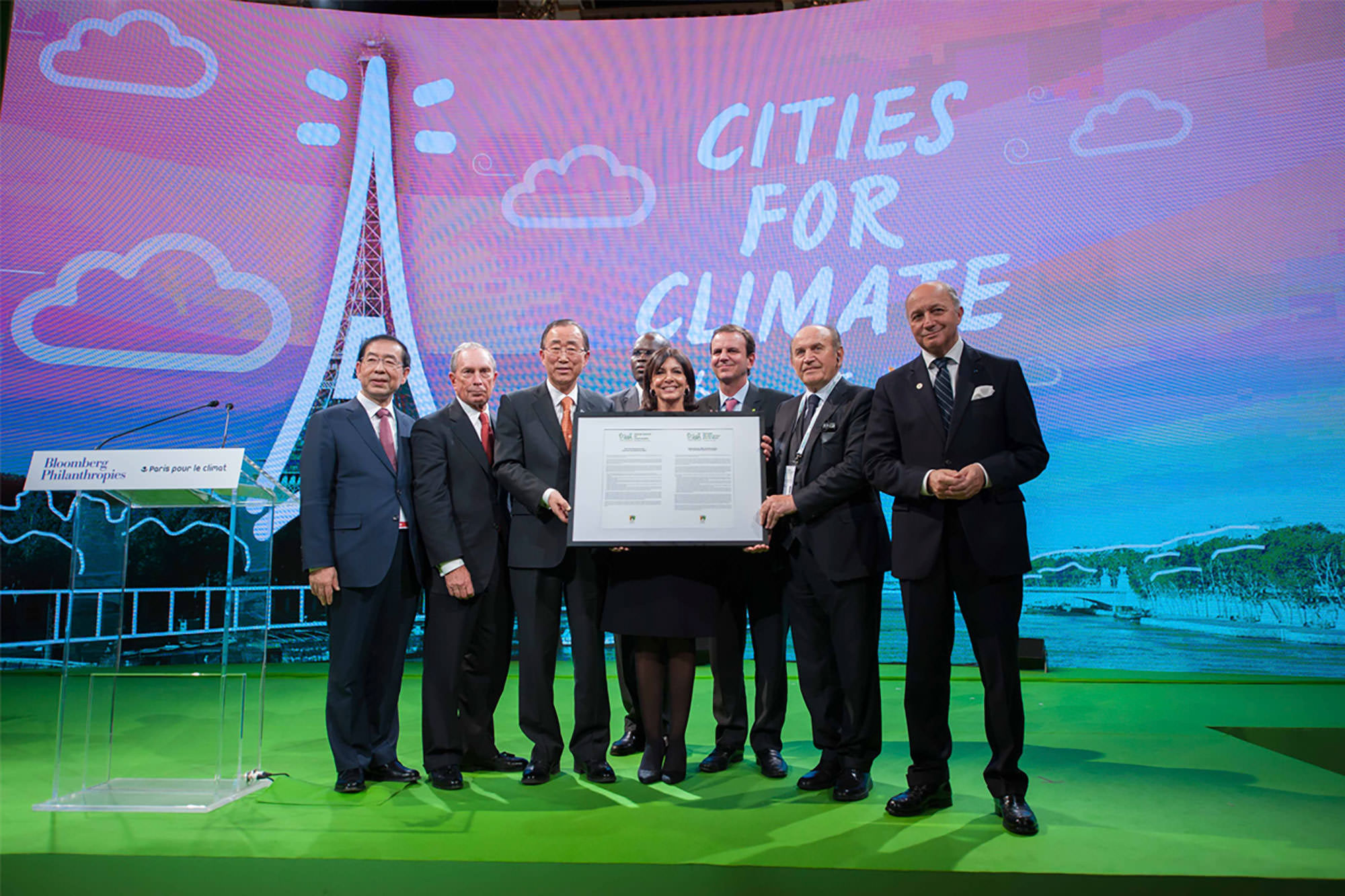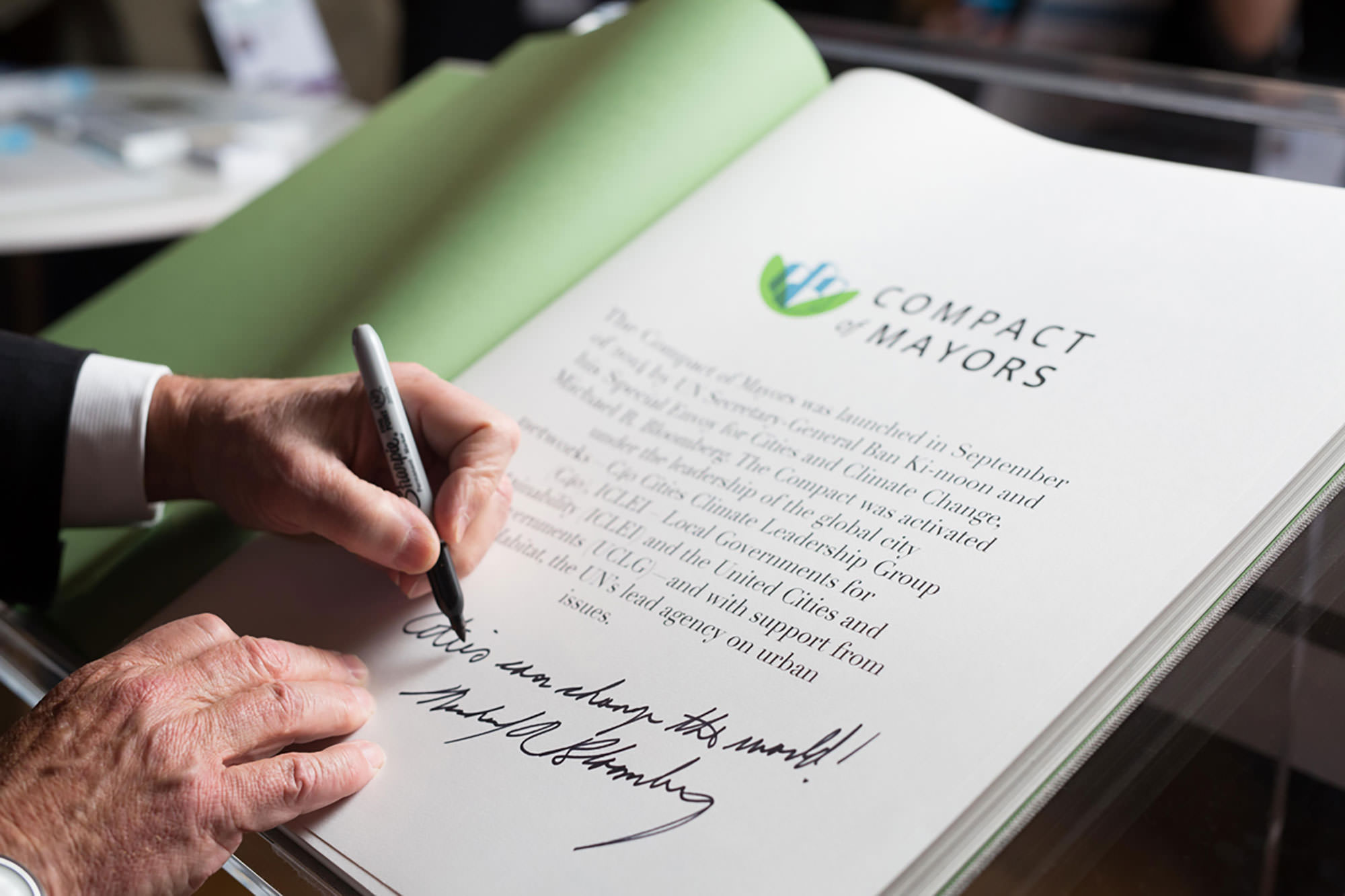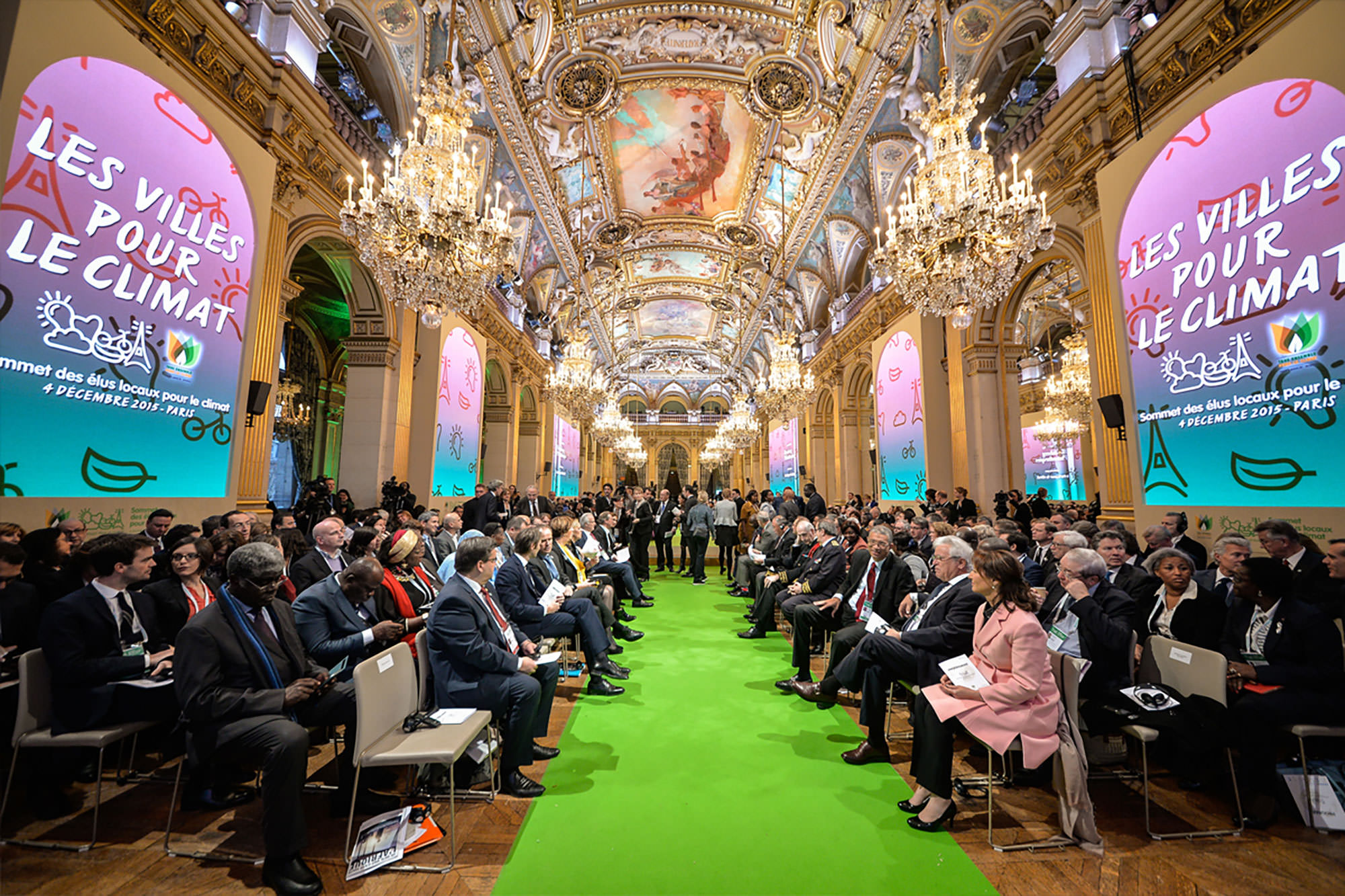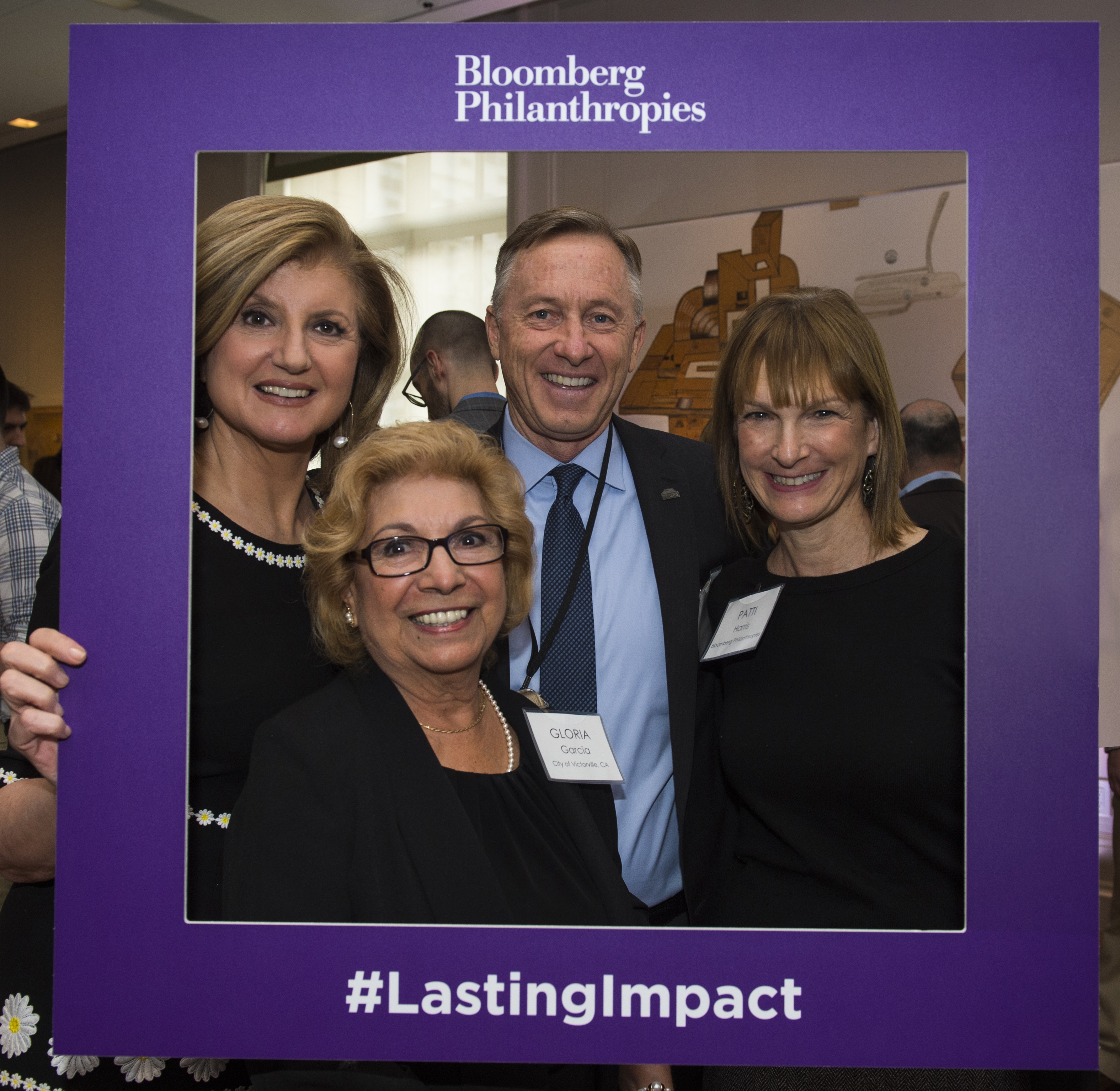Letter from our founder
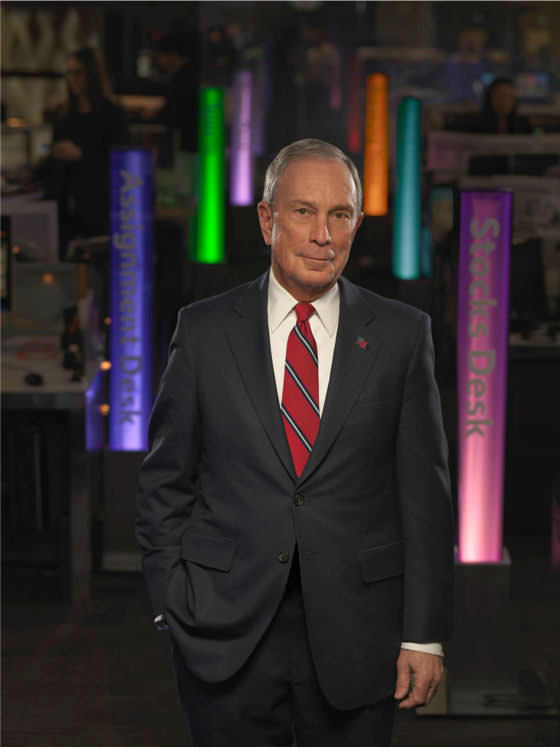
Michael R. Bloomberg
Founder
In December of 2015, after more than two decades of stalemate, 196 nations committed themselves to reducing their greenhouse gas emissions at a climate change conference in Paris. They joined hundreds of cities, thousands of businesses, and countless citizens that had already made such commitments. At long last, all the major players have lined up on the same side of the field. But having a full roster is a far cry from having a great team, to say nothing of winning a championship. Success will require leadership that unites everyone behind a common mission and gets everyone to work together by promoting communication, collaboration, and coordination. It’s a role that Bloomberg Philanthropies has fully embraced.
As we look beyond Paris, Bloomberg Philanthropies will work with all the major players—nations, cities, businesses, and civic organizations—on a coordinated campaign to cut greenhouse gas emissions immediately. The Paris Agreement requires national progress beginning in 2020, but that won’t do. The challenge is too urgent. The dangers of delay are too severe. And the momentum that Paris has provided is too valuable to squander. The work of becoming a real team—not just one that exists on paper—must begin now.
The good news: We have already won two victories that are crucial to long-term success. First, the old argument between skeptics who saw no need to act and alarmists who predicted impending doom has lost its dominant hold on our political discourse. There are still some—ideologues on both sides of the climate issue and elected officials in both U.S. political parties—who insist on carrying on that argument. But most people have moved on, because—whatever one thinks of the scientific studies—the economic risks of inaction are too great and the public health dangers are indisputably severe.
The second major victory is no less important: The old argument between developed and developing countries over who was responsible for leading the way forward has finally given way to the realization that we all must do more, together. Nations united in Paris not after a moment of epiphany, but only after mayors and local leaders from around the world had spent years urging their national governments to join them in confronting the issue aggressively; after business leaders had expressed major concern about the issue; after investors had demonstrated their appetite for clean energy projects; and after citizens demanded action. The top- down approach to reaching a global climate accord had failed for decades. A bottom-up approach, with cities and businesses leading the way, proved successful.
Thanks to a newfound global consensus on climate change, plus plunging costs for clean energy and a growing recognition of the costs of inaction, we turned a corner in Paris. Today, for the first time, it’s possible to see a realistic path that leads to a low-carbon future. No shortage of difficult obstacles lie ahead, but overcoming them is possible—if the major players communicate, collaborate, and coordinate effectively. In the year ahead, Bloomberg Philanthropies will work with each group to ensure that happens. Here’s a preview of what our work will entail.
Cities
Cities have been among the most aggressive players on climate change, because they are the biggest source of the problem—they account for about 70 percent of global emissions—and also face the gravest health and economic risks. More than 500 cities representing over 425 million citizens have signed the Compact of Mayors, which commits them to setting ambitious goals and assessing their progress using transparent and uniform measurements. In Paris, nations adopted similar requirements to transparently report, and review over time, their progress in cutting emissions. During the Paris conference, Bloomberg Philanthropies and Paris Mayor Anne Hidalgo co-hosted more than 1,000 mayors and local officials at the Climate Summit for Local Leaders, drawing attention to the pioneering work already being done by cities.
Through my work as the UN Secretary-General’s Special Envoy for Cities and Climate Change and as President of the C40 Cities Climate Leadership Group, I’ve seen how eager local leaders are to cut emissions. But I’ve also seen how they are held back from acting because of a lack of resources and authority. For instance, many cities lack the credit ratings necessary to borrow money in capital markets. Without credit, they are unable to make major investments in low-carbon infrastructure that would reduce their carbon footprints, improve public health, and strengthen their economies.
Working with C40, we’re exploring new ways to give cities access to global capital markets. It’s one of the most important steps we can take to help cities reach the goals they are setting through the Compact of Mayors. But it’s far from enough.
In addition to lack of credit, cities are hampered by outmoded regulations, centralized monopolies, and national governments that may be less than fully supportive of cities’ climate goals. By showing national leaders that empowered cities will make it easier for them to reach national goals, we aim to promote more collaboration and cooperation among cities and national governments. As part of this work, we once again convened global cities in Washington, D.C., in May.
Paris was only a starting point. City leaders know that the real work is just beginning.
Businesses
Climate change carries major economic implications for every industry: droughts threaten crop yields and livestock, floods threaten cities and coastal real estate, and warming oceans threaten fisheries and marine life.
Yet until recently, these threats were largely or entirely ignored by business owners, executives, and investors— and for good reason: There was little reliable information about them. That is slowly starting to change.
One of the most effective ways of fighting climate change is also the least expensive: making markets more transparent. Giving business owners, executives, and investors accurate and reliable data about climate change allows them to price risk into their decisions— improving the stability of markets and making low-carbon investments more attractive. Successful business leaders do not have the luxury of ignoring future risks and hoping for the best. They must work to identify and mitigate their exposure to risks, and climate change is no exception.
Two years ago, Hank Paulson, Tom Steyer, and I created the Risky Business Project to raise awareness of the economic challenges that climate change presents in the United States by providing localized and industry-specific climate data to business leaders and policy makers. Since then, Bloomberg Philanthropies has expanded that work by supporting two other efforts that hold great potential to improve the transparency of markets.
The first is the Sustainability Accounting Standards Board (SASB), which creates disclosure standards for companies. SASB helps companies assess their internal sustainability efforts while enabling investors to compare similar companies across a range of rigorous sustainability metrics. This year, after finalizing draft standards for 10 sectors and 79 industries, SASB will launch a pilot reporting program involving several companies to demonstrate how disclosures are a cost-effective and compelling way for businesses to understand the material risks that climate change and other sustainability factors pose to their operations.
The second effort began at the Paris climate summit, when Bank of England Governor Mark Carney, in his capacity as chairman of the Financial Stability Board (which monitors the global financial system), asked me to a lead a new taskforce on the financial risks of climate change. Since then, we’ve begun working with banks and other financial institutions to develop a common set of voluntary guidelines to bring transparency to the opaque risks that climate change presents to financial markets. The market cannot accurately value companies, and investors cannot efficiently allocate capital, without reliable data on the risks they face.
The growth of my company, a financial information tech start-up I founded 35 years ago, is a testament to the fact that investors value transparent markets and reliable data. Market forces, combined with technological innovation, are the two most powerful drivers of change in the world. If we’re going to win the battle against climate change, we need to tap into both of them—and that starts with giving investors better information about the true costs and risks of climate change, as well as the potential dividends of low-carbon projects and companies.
Citizens
Like cities and businesses, citizens and local communities have self-interested reasons to fight climate change, but they don’t always have the tools to do so. Working with the Sierra Club, we are empowering communities across the United States to close coal-fired power plants. Of course, coal pollution doesn’t just contribute to climate change. It also kills thousands of people a year through heart attacks and respiratory disease. Our Beyond Coal campaign has already phased out 232 coal plants and helped reduce the number of people in the United States killed by air pollution from coal each year from 13,000 to 7,500. That’s a big reason why the United States is already nearly half-way to the emissions reduction goal it set in Paris.
By the end of 2017, we aim to secure the retirement of half the United States coal capacity, compared with 2010—something that was almost unthinkable back then. Building on the success of Beyond Coal, the Sierra Club has also launched a new program— called Ready for 100—that helps cities move toward a full transition away from fossil fuels and toward 100% renewable energy.
Empowering communities also means supporting individuals who develop creative new ways to engage the public. During the COP21 summit in Paris, Bloomberg Philanthropies supported Olafur Eliasson and Minik Rosing’s Ice Watch, an installation of ice collected from an iceberg drifting off of Greenland. They set it in the Place du Panthéon, arranged in the shape of a clockface. As it slowly melted during the course of the summit, it drew the world’s attention to the pressing climate crisis. The best public art makes people stop and think—and this installation went further, inspiring those who saw it in person or online to act.
Nations
Now that national governments have committed to action, we must ensure that they follow through. The Paris Agreement included a provision (which city leaders had pushed for) committing nations to regular and transparent reporting of progress. That will allow the global community, as well as cities and voters, to hold national governments accountable for fulfilling their commitments.
At the United Nations’ Climate Action 2016 Summit in May, one subject of discussion was the steps national leaders can take to empower local and regional officials. Here in the United States, there’s new momentum to develop smart, forward-looking energy policies. Bloomberg Philanthropies is helping governments craft energy policies that shift electric power production away from coal to renewable energy sources. These policies are putting us on track to meet the 2025 emissions goals set by the Obama Administration in its Paris pledge, as well as the 2030 target set by the EPA’s Clean Power Plan.
While the Supreme Court temporarily halted full implementation of the Clean Power Plan in February 2016, many states are proceeding on their own, and some—including California and New York—have set goals that far exceed what the federal government calls for. In a political climate plagued by gridlock and hyper-partisanship, we must continue to look beyond Washington for leadership.
Each major player in the fight against climate change has a crucial role to play—and, for the first time, every player has committed to action. But success is only possible if they work together.
At Bloomberg Philanthropies, we take to heart that most important rule: The whole is always greater than the sum of its parts. With teamwork, and by focusing on data, we can win the battle against climate change. And in the process, we can save thousands of lives and build a stronger and more prosperous global society.
Sincerely,

Michael R. Bloomberg
Letter from our CEO
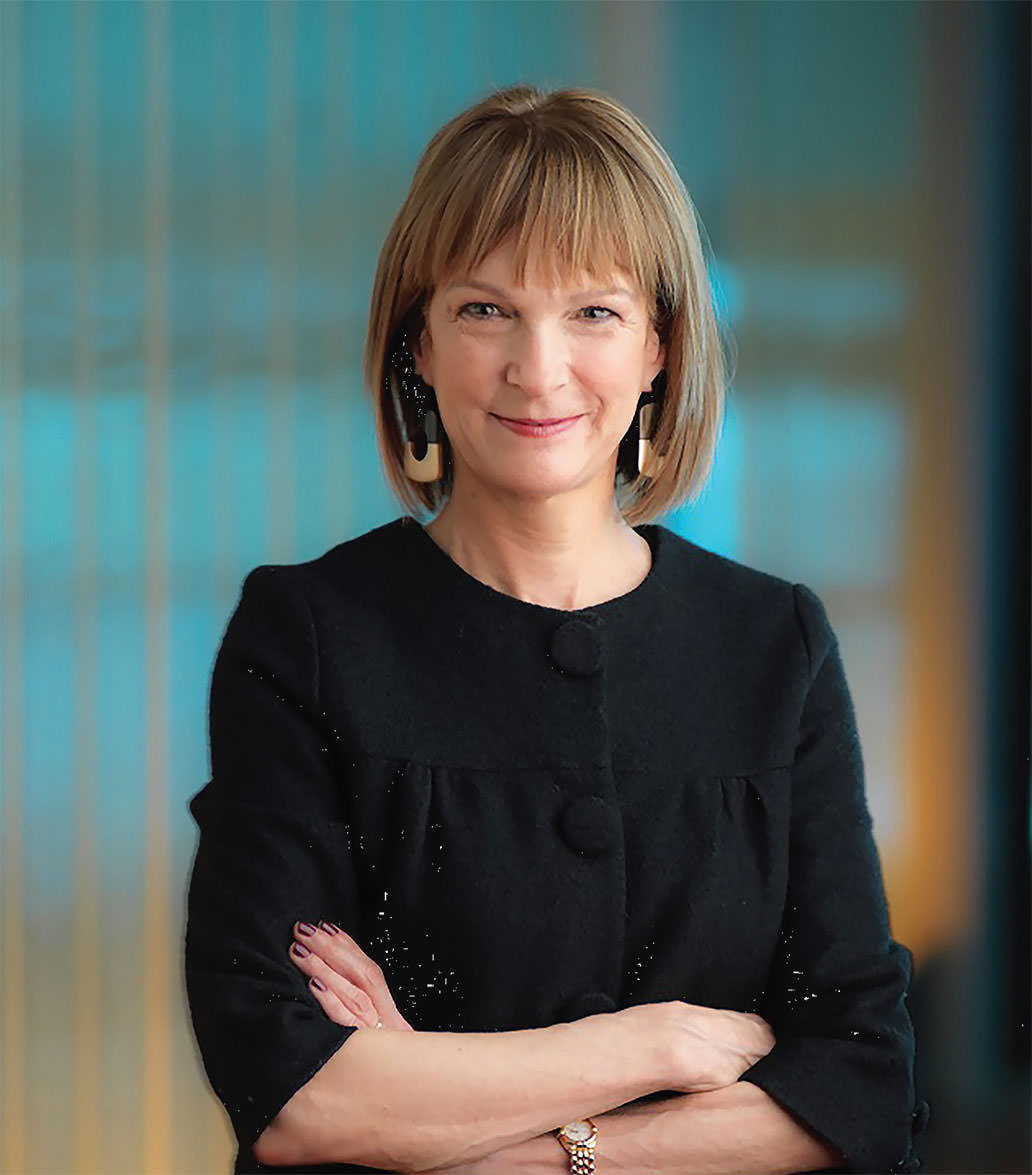
Patricia E. Harris
Chief Executive Officer
When I visited Moscow for the first time last June, I found a dynamic city filled with beautiful architecture, fascinating history, and welcoming people. It turns out, though, that the most remarkable thing in Moscow was what I didn’t experience: tobacco smoke.
Russia has a long history of smoking and, until recently, the country’s tobacco control program was virtually non- existent. That changed when Bloomberg Philanthropies’ Initiative to Reduce Tobacco Use started working there in 2007. In the subsequent nine years, tobacco control has gained traction in Russia, and thanks to our partners, we’ve made substantial progress. I’ll never forget when an ex-smoker I met there hugged me in gratitude for the work that we do.
Our work in Russia is part of our global tobacco control program, the most ambitious initiative of its kind in the world. Over the last ten years, it has helped save tens of millions of lives—but it is only a single spoke in a large wheel of activities aimed at making a difference in people’s lives. For our annual report, we want to share some of the results that make our work so gratifying.
Over the past year, we’ve seen inspiring progress in each of our five major areas of work—the environment, the arts, education, public health, and government innovation—and in helping women play a greater role in Rwanda’s and Congo’s rising economies. In addition, our philanthropic consulting firm, Bloomberg Associates, is working with urban leaders around the world on the most critical issues facing their cities, and our colleagues at Bloomberg L.P. are dedicating their time and expertise to strengthening local communities through volunteer service.
Together with our grantees, which range from national and local governments to nonprofit organizations and research institutions, we’re unafraid to take risks. We follow the data, make big commitments, and set bold goals. In 2015, our major new initiatives and investments included:
• A $48 million new Clean Energy Initiative to limit carbon pollution from power plants and spur clean energy investments. This initiative supports advocates, technical experts, and lawyers to help states develop climate plans that move them off coal and toward compliance with the new EPA carbon rules finalized in 2015.
• An additional $30 million investment in the Sierra Club’s Beyond Coal campaign (bringing our total investment to $80 million) to halve the amount of coal burned for power generation by the end of 2017 and to ease our country’s transition to clean energy sources. So far we’ve helped close 232 coal plants in the United States. A conference for more than 1,000 local leaders from more than 600 cities, including 446 mayors, at COP21 in Paris. Co-hosted with Paris Mayor Anne Hidalgo, Bloomberg Philanthropies convened the Climate Summit for Local Leaders, where mayors and other officials from around the world committed to taking more ambitious climate actions through the Compact of Mayors.
• A Public Art Challenge launched in the United States to help select cities fund temporary art projects that address civic issues.
• A $30 million commitment to nationally expand our Arts Innovation and Management program for small- and medium-sized cultural institutions in six cities around the country.
• An expansion of the CollegePoint program, which, by providing free virtual advising (on the phone and online), aims to increase the number of high-achieving, low- to moderate-income students who enroll in the most selective US colleges and universities.
• A $125 million reinvestment to support road safety efforts globally and assist cities and national governments in reducing road crashes, one of the world’s leading causes of preventable death.
• An Anti-Tobacco Trade Litigation Fund created with the Bill & Melinda Gates Foundation to combat the tobacco industry’s use of international trade agreements to threaten and prevent countries from passing strong, life-saving tobacco control laws.
• A $100 million Data for Health program, launched with our partners in the Australian government, that already is working to improve health data in developing countries so that governments, aid organizations, and public health leaders can use this information to prioritize risks, develop policies, deploy resources, and measure success.
• A new partnership with the Government of India to encourage smarter urban development by helping design its Smart Cities Challenge, through which cities competed for development funds by proposing the most innovative and impactful projects.
• A $42 million “What Works Cities” initiative to help mayors use and analyze data more effectively for decision-making.
• A free database for nonprofits and governments called Equal Footing that provides information about funding in sub-Saharan Africa.
• A new $125 million research center, the Bloomberg~Kimmel Center for Cancer Immunotherapy at Johns Hopkins University. Immunotherapy is a technique that deploys the body’s immune system against cancer, one of the most promising developments in cancer research. The Center builds on Michael Bloomberg’s investments in public health research and infrastructure at Johns Hopkins University.
Bloomberg Philanthropies has had an exciting, fast-paced 2015, and 2016 holds even more promise as we expand our successful programs and add new ones. In the following pages, you will see the challenges, opportunities, and approaches we have employed to further our mission: ensuring better, longer lives for the greatest number of people.
Sincerely,
Patricia E. Harris
Chief Executive Officer
